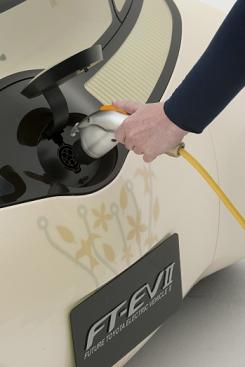NJ Energy Regulators Consider Plug-in Electric Cars
 Groups advocating higher use of plug-in electric cars and other alternatively powered vehicles for public transportation and for state-owned fleets jockeyed to be part of a dialogue on New Jersey’s energy future during a public hearing on November 2. The state Board of Public Utilities has been testing the waters to see how much interest there is in having the state break from its reliance on traditional gasoline-powered vehicles.
Groups advocating higher use of plug-in electric cars and other alternatively powered vehicles for public transportation and for state-owned fleets jockeyed to be part of a dialogue on New Jersey’s energy future during a public hearing on November 2. The state Board of Public Utilities has been testing the waters to see how much interest there is in having the state break from its reliance on traditional gasoline-powered vehicles.
Proponents of cleaner-running vehicles powered by electric, natural gas, propane, biodiesel, ethanol, and hydrogen all had a say, claiming there are market-ready products that will cut into the use of petroleum.
Ray Kenard, Executive Director of the Northeast Transportation Electrification Alliance, which works with commercial fleet operators on cutting truck emissions, said, "Electric power will be the wave of the future. Innovations will occur that will drive costs of the technology down and efficiencies will increase."
The meeting followed the release of a 24-page report from the BPU’s work-study group on alternatively fueled vehicles. BPU President Lee Solomon said the report and testimony from the meeting would be incorporated in a new state Energy Master Plan.
The policy recommendations could spur programs rich with subsidies and other incentives for alternatively fueled vehicles, officials said.
Chuck Feinberg, who headed the BPU study group and also serves as Chairman of New Jersey Clean Cities Coalition, said New Jersey "has made progress but is still in the early stages in the development of a statewide alternative fueling infrastructure," with only thirteen electric charging stations available and twenty for compressed natural gas.
Feinberg said state government can stoke interest by converting its stock of government passenger vehicles, and other state-owned fleets such as Department of Transportation’s heavy duty vehicles, into alternatively fueled vehicles.
DOT spokesman Joe Dee said Department of Transportation and NJ Transit have more than 450 vehicles that run on electric, ethanol, natural gas, and other new products.
 Groups advocating higher use of plug-in electric cars and other alternatively powered vehicles for public transportation and for state-owned fleets jockeyed to be part of a dialogue on New Jersey’s energy future during a public hearing on November 2. The state Board of Public Utilities has been testing the waters to see how much interest there is in having the state break from its reliance on traditional gasoline-powered vehicles.
Groups advocating higher use of plug-in electric cars and other alternatively powered vehicles for public transportation and for state-owned fleets jockeyed to be part of a dialogue on New Jersey’s energy future during a public hearing on November 2. The state Board of Public Utilities has been testing the waters to see how much interest there is in having the state break from its reliance on traditional gasoline-powered vehicles.